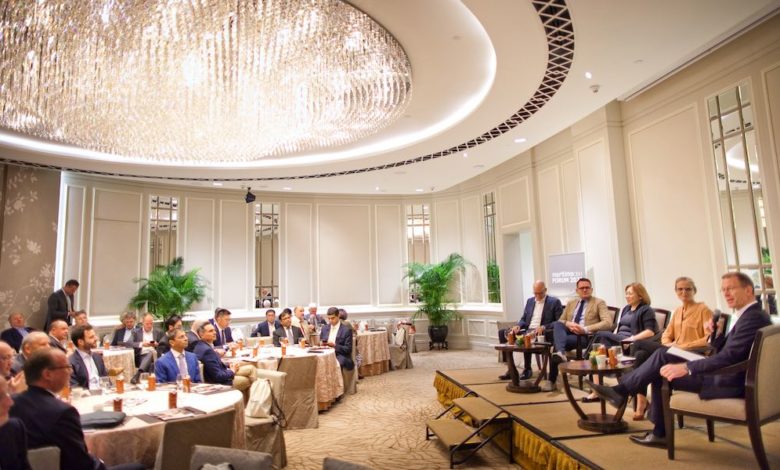Maritime CEO Forum Singapore: Shipping will face competition for new fuels

All week Splash is bringing readers key takeaways from last Thursday’s Maritime CEO Forum, an exclusive shipowner gathering held at the Fullerton Hotel in Singapore. Today’s report focuses on the decarbonisation session, and fears that shipping might lose out to other industries in the scramble for alternative fuels.
Caroline Yang, CEO on bunker craft operator Hong Lam Marine and president of the Singapore Shipping Association (SSA), told delegates it was vital shipping coalesced and aggregated significant demand for new fuels.
Bunkers have always been the residual fuel no one else was willing to use, so supplies and prices have generally been stable, she pointed out. Prices and availability of alternative fuels remain questionable as other better resourced industries will be chasing the same resources, Yang warned. By way of an example, the SSA president pointed out that shipping’s current transitional fuel of choice – LNG – was not being burned on any ships as it had become too expensive.
Transformation lies in community – it requires partnerships
Yang, as head of both the SSA and a top local bunker firm, was able to provide delegates with the thinking which authorities in Singapore, the world’s top bunkering hub, have when it comes to the winners in the future fuels race.
“For alternative fuels, Singapore thinks ammonia is a definite fuel of the future,” Yang said, adding that bunkering standards and guidelines are being worked on this new fuel as well as for biofuels.
Quizzed by audience member, Erik Lewenhaupt, CEO of Swedish tanker player Concordia Maritime, on the lack of a common emissions standard for alternative fuels, Yang said the International Maritime Organization (IMO) “must get its act together”, and if the United Nations body did not, Singapore will, with the city-state very close to releasing its own ammonia emissions standards soon.
The wide ranging panel debate, moderated by Steen Lund, the CEO of RightShip, featured two shipowners, a major charterer in the form of Rio Tinto, and tech advice from Denmark’s ZeroNorth with topics covered including all things carbon – credits, capture, and pricing, as well as ESG, and the importance of partnerships to achieve decarbonisation goals.
James Marshall, CEO of Berge Bulk, one of Singapore’s largest dry bulk owners, laid out how his company aims to be carbon neutral by 2025, and to have a first zero-emission ship on the water by 2030 with ammonia and nuclear forming much of the thinking at his company in terms of future fleet development.
On carbon credits, which Marshall has backed in order to get to his ambitious 2025 goal, the Berge Bulk boss conceded that they are not “bullet-proof at all”, however he insisted it was best to focus on what shipping can do today and acting on it fast. Moreover, some form of offsetting will likely to be needed even in 2050, Marshall said, as not all of the global merchant fleet will be net zero by then.
On carbon credits, Laure Baratgin, head of commercial operations at Rio Tinto, said they were something her company wanted to avoid with concerns over traceability, instead focusing on new fuels, and working with partners to develop green corridors, supporting first movers and pressing for some form of carbon pricing. Carbon capture is an area Rio Tinto is interested in helping owners, getting technology to bring some circularity to the industry, perhaps to produce green methanol, Baratgin said.
“It’s an end-to-end approach – everyone has to do their bit,” the Rio Tinto executive told delegates, adding: “It is all about the carbon price ultimately.”
She stressed it was vital that first movers were not penalised, and the best way to ensure this would be via a global regulation on carbon pricing.
The debate also spent plenty of time discussing harnessing existing tech to bring down emissions of today’s fleet.
“Transformation lies in community – it requires partnerships. If we don’t start venturing out and using the current technologies that are out there then we will never succeed. The industry needs to invest as partners in the technology,” argued Jesper Bo Hansen, chief revenue officer at ZeroNorth.
Hansen said that historically there has been a misalignment in incentives.
“We think by putting data out there and creating transparency there is then a mutual incentive between owners and charterers to reduce emissions,” he said, adding: “We believe that the industry needs to come together – share data and create a mutually incentivised environment in which we all win.”
Maritime CEO Forum Singapore 2022 was sponsored by Aderco, Cobham Satcom, CyberOwl, Dualog, Inmarsat, Liberian Registry, Ocean Technologies Group, SEDNA, Synergy Group, Vanir Marine, Wallem, WIZ Bulk and Zero North.
The next Maritime CEO Forum takes place at the Monaco Yacht Club on October 12 while April 24 has been announced as the date for the event’s return to Singapore, timed to coincide with the start of the city’s busy official maritime week.
